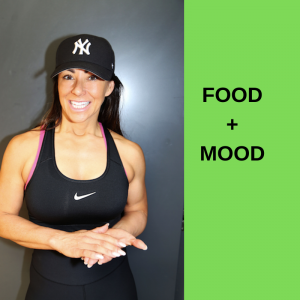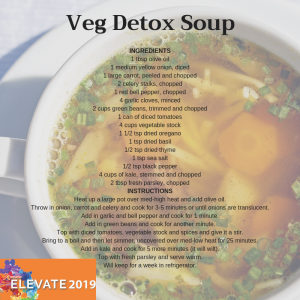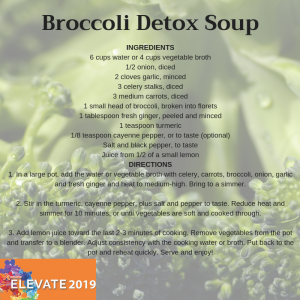Have you been feeling down lately with a lack of energy? It is most likely your diet affecting your mood and energy levels.

We are big believers in food for health…the Kick Start way of eating can transform your mental health; increasing energy, positivity and relieving anxiety. We have had so many stories from women and men all over the world who have changed their lives through eating right.
Here are some of the explanations in the relationship between food and mood:
- Spikes and drops in blood sugar levels caused by food are associated with changes in mood and energy.
- Food influences brain chemicals influence and how we think.
- Artificial colourings and flavourings are in so many foods and the can cause abnormal reactions.
- People an have hidden food allergies that they may not be aware of and can become hypersensitive to foods.
- Nutritional deficiencies from not eating enough of the right foods for example- not getting enough vitamins, minerals and essential fatty acids can affect mental health.
What’s the psychological relationship?
It is quite well known, the link to feeling down with going to the cupboard and picking out easy comfort food. Something not as well known is the link with food to mood, for example we might choose to drink coffee if we are feeling tired and need some energy. But too much caffeine can cause symptoms, such as anxiety, nervousness and depression. With these links in mind try to consciously think next time you reach for food when you are down, try to replace it with something full of nutrients and your health will thank you for it! Eat good food that keeps you fuller for longer to also try and cut down these cravings.
How do I find out if food is affecting my mental health?
Try and keep a diary to see what you are eating NOW. You may not realise what your diet is really like and this will then help you plan out how you can change it.
Read below for more on how food could be affecting YOUR mood and what you can do to change it!
How often are you eating?
Being hungry can make you feel tired, irritable and depressed. You need to eat regularly and choose foods that release energy slowly. Include good fats like avocados and plenty of proteins to keep you fuller for longer.
Avoid foods which make your blood sugar rise and fall such as sugary foods.
Are you eating enough vegetables?
Vegetables contain a lot of the minerals, vitamins and fibre we need to keep us healthy physically and mentally. So ensure you include a variety in each meal and eat PLENTY.
Are you drinking enough
The guideline is 3 litres a day… I know that can seem quite a task, but by keeping water always available you will find you drink more. If you don’t drink enough water, you can feel down and low on energy. If you don’t like water then add a slice of lemon or try herbal teas.
Are you eating enough GOOD fats?
Your brain needs good fats to keep it healthy. Try having more oily fish, sprinkle seeds on a salad with a little olive oil too, use coconut oil to cook with and eat avocados daily.
Are you eating protein?
Your brain needs amino acids, that are in protein, to regulate and balance your feelings. Include organic chicken, turkey and eggs in your meal plan.
Are you a coffee addict?
Too much caffeine can make you feel anxious, as a stimulant it is not good for late at night either as it may disturb your sleep! Try and cut it down or swap for fruit teas!
Are you taking medication?
Anti depressant medication can have adverse affects with certain foods so ask your doctor or check the packaging.
If someone is on mainstream anti-depressant drugs such as SSRI’s, SSNI’s or Tricyclics, these drugs destroy B-vitamins in the body and it is therefore essential to replenish these stores through diet or supplementation.
These main related nutrients are:
B1 / B3 / B5 / B6 / B12 – deficiencies lead to poor concentration, poor memory, irritability, stress, depression.
Folic Acid – deficiencies lead to anxiety & depression
Magnesium – deficiencies lead to anxiety, depression, irritability, stress, insomnia
Vitamin C – deficiencies lead to depression
Selenium – deficiencies lead to depression, irritability
Zinc – deficiencies lead to depression, confusion, blank mind, loss of appetite, lack of motivation.
Omega 3 – deficiencies lead to depression, poor memory
Tryptophan – deficiencies lead to depression
This list is sourced from the Mental Health Foundation.
KICK START FRIENDLY GOOD MOOD FOODS
Walnuts – Tryptophan rich
Brazil nuts – selenium rich
Sunflower & pumpkin seeds – magnesium, omega 3, zinc (with sunflower seeds also being rich in selenium)
Garlic – selenium
Olive oil – omega 3
Hemp oil – omegas 3, 6 & 9
Peppers – B-vits, magnesium
Broccoli – B-vits, magnesium
Spinach – Folic acid
Bananas – B6, tryptophan
Berries – vitamin C
Chicken & turkey – B12, tryptophan
Salmon & tuna – B12, omega 3, selenium & zinc
Eggs – B12
Try these soup recipes:


⚡️Would you love to receive helpful info, motivation, news and more straight into your inbox?
Join my free mailing lists:
✅For Fitness Pilates/ Pilates Instructors:
https://www.choreographytogo.com/fitness-pilates-newsletter/
✅For Nutrition/ health/ wellness/ fitness from Kick Start:
https://www.kickstartfatloss.net/kick-start-newsletter-sign-up/
✅For Fitness news and Instructors:
https://www.choreographytogo.com/c2go-newsletter/
✅For Business:
https://www.choreographytogo.com/business-newsletter-sign-up/
Posted on


Leave a Reply